The Six Knights: The Prince's Bodyguard: Difference between revisions
No edit summary |
No edit summary |
||
| Line 33: | Line 33: | ||
<span style="color:#800000;"> ''The black knight stepped back from the lip, passing a hand across his forehead as if something had momentarily bothered him. By magic, the well was suddenly filled with all the bits of beast that the black knight had ever brought for the ''"Dragonfeast"''. The Six, suddenly angered, again set themselves to concentrating. With an audible chuckle, the black knight carried the flaxen-haired child to the well, killed her, and sprinkled her blood across the remains at the top of the filled well. Then he sat at the edge of the pit as if awaiting something.'' | <span style="color:#800000;"> ''The black knight stepped back from the lip, passing a hand across his forehead as if something had momentarily bothered him. By magic, the well was suddenly filled with all the bits of beast that the black knight had ever brought for the ''"Dragonfeast"''. The Six, suddenly angered, again set themselves to concentrating. With an audible chuckle, the black knight carried the flaxen-haired child to the well, killed her, and sprinkled her blood across the remains at the top of the filled well. Then he sat at the edge of the pit as if awaiting something.'' | ||
<span style="color:#800000;"> '' | <span style="color:#800000;"> ''And indeed, hours later, something did happen. The Six, sweating blood from the exertion of controlling the black knight, found a chink in his defenses. At the same time, the king, smiling and pale, miraculously clambered up through the remains that filled the magic well and began to feast upon the child's blood. The Six silently ordered the black knight to surrender to the king, and he did, laying his head in the king's lap as meekly as a lamb.'' | ||
<span style="color:#800000;"> '' | <span style="color:#800000;"> ''When the king had feasted, the Six emerged from the shadows of the hall and celebrated the ''"New Arthur"'' by having him knight them beneath the druidic oak that grew just outside the castle. Ever since then, they have followed the king faithfully and have even become princes of the various cities in Massachusetts under his beneficent reign.'' | ||
<span style="color:#800000;"> '' | <span style="color:#800000;"> ''Recently, however, the New Arthur has required the knights to do King Biltmore's pawns (read: Redcoats) demand. Why their own king would have them make obeisance to the petty demands of an evil king's pawns, they do not know, but they are beginning to fear that their once-glorious ruler is now under an ensorcellment of a most vile nature. While they staunchly refuse to disobey Quentin King, the knights strongly resent the presence of these courtiers and find their demands humiliating. Their current disposition is to find out who cast the ensorcellment over their king and then slay him or her.'' | ||
Revision as of 12:18, 22 May 2016
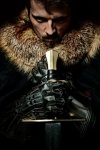 Sir Praxis -- Lord of Worcester Sir Praxis -- Lord of Worcester
|
 Sir Sine Qua Non -- Lord of New Bedford Sir Sine Qua Non -- Lord of New Bedford
|
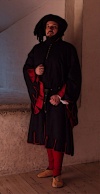 Sir Pro Bono -- Lord of Gloucester Sir Pro Bono -- Lord of Gloucester
|
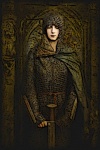 Sir Sine Die -- Lord of Lowell Sir Sine Die -- Lord of Lowell
|
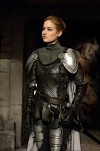 Sir Cum Laude -- Lady Seneschal of Boston Sir Cum Laude -- Lady Seneschal of Boston
|
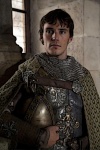 Sir Probus -- Lord of Quincy Sir Probus -- Lord of Quincy
|
Institutionalized for various severe mental illnesses long before being Embraced, these three men, two women and a teenage boy found a precarious stability in each other. Until they met at Bridgewater State Asylum, each had suffered from some form of catatonia or solitary delusion. They soon became fast companions, sharing a delusory medieval world of dragons, kings and sorcerers which, by the mad workings of their unbalanced minds, they created together.
Although this group delusion was a deeper and more complex problem than had previously existed, it at least gave them a limited ability to interact with the real world. They saw their doctors as monks, and Bridgewater as a monastery where they were knights recovering from a bloody quest.
One evening, a black knight came to the monastery and ensorcelled them -- at least, that is how they viewed their Embrace. The knight, who called himself Skarvan, took them far from the monastery. They traveled on enchanted steeds to New York City. There, the knight showed them their new castle -- an abandoned shack outside the city -- which, as his squires, they were to defend at all costs.
Every night they would rise from their earthen beds and watch the black knight ride out to prepare the "Dragonfeast" -- the kidnapping, murder and exsanguination of a mortal. The knight would return with a beast and its spawn (several mortals) that he had killed in "deadly combat," and then feed the neonate squires their blood.
At first the Six were content with this way of life. Their lord provided for their needs and they in turn guarded his demesnes -- with their unlives should the occasion arise. Gradually, however, they became disenchanted. No longer did they wish to remain squires, for the time had come to prove themselves in combat and become knights. Yet the black knight would permit no such thing. They were to remain at the castle and defend their sire.
Then came the fateful night when Sir Skarvan did not return from his customary beast hunt. The Six waited, but they were not to indulge in the "Dragonfeast" that evening, or the next. Three evenings later, one of the Six suggest that they quest for the missing knight, and that perhaps on the way they would find adventure.
Their search, which extended no further than a neighboring town, was fruitless, and they determined that while they awaited the knight's return, they would practice the lordly skill of beast-killing. The Six survived in this manner until one evening, weeks later, Sir Skarvan, the black knight, returned on his magnificent black stallion. With him were a small child and a man of noble bearing and royal features, both bound and gagged.
The Six withdrew into the shadows of the castle as the black knight thundered into the dining hall, pushing the man and child off his horse. Leaving them bound on the cobblestones, the knight dismounted, strode to the back of the hall and, with great magic (a shovel), created a deep well that reached unto the core of the earth. Then he returned to the man, None of the Six had seen such a king before, and all were curious as to why the noble had been tied and gagged. The answer soon became clear: the black knight meant to ensorcell the noble and make him his squire.
None of the Six approved: this noble was obviously the knight's better, and already Sir Skarvan had six squires, five more than than all the other knights in the land. With the realization that the knight had little honor and much greed, part of the ensorcellment began to dissolve. Now the Six saw themselves as slaves of Sir Skarvan and, more importantly, knew that the noble lying on the cobblestones was a king, a lord of such might that he could dispel Sir Skarvan's evil enchantments.
The black knight lifted the king high over his head and carried him to the lip of the well even as the Six looked on. Then, lowering him, he sank a set of long, sharp fangs deep into the king's neck. The Six (themselves vampires, but not realizing it) were shocked that the knight they had served was himself a beast. As if of one mind, they began to concentrate on destroying the bestial Sir Skarvan in order to save the king. The black knight did not suspect anything, for the Six's powers were subtle and very gradual, and at first his self-confidence proved ample armor against their attack.
Though the Six concentrated, the black knight continued to drain the king of his blood until the man slipped, limp, to the very edge of the well. Skarvan, kneeling, opened his wrist and allowed the king to drink -- one sip, perhaps two. With that, he pushed the king into the bottomless well and the Six heard a scream echoing up from its darkness. Their concentration broke.
The black knight stepped back from the lip, passing a hand across his forehead as if something had momentarily bothered him. By magic, the well was suddenly filled with all the bits of beast that the black knight had ever brought for the "Dragonfeast". The Six, suddenly angered, again set themselves to concentrating. With an audible chuckle, the black knight carried the flaxen-haired child to the well, killed her, and sprinkled her blood across the remains at the top of the filled well. Then he sat at the edge of the pit as if awaiting something.
And indeed, hours later, something did happen. The Six, sweating blood from the exertion of controlling the black knight, found a chink in his defenses. At the same time, the king, smiling and pale, miraculously clambered up through the remains that filled the magic well and began to feast upon the child's blood. The Six silently ordered the black knight to surrender to the king, and he did, laying his head in the king's lap as meekly as a lamb.
When the king had feasted, the Six emerged from the shadows of the hall and celebrated the "New Arthur" by having him knight them beneath the druidic oak that grew just outside the castle. Ever since then, they have followed the king faithfully and have even become princes of the various cities in Massachusetts under his beneficent reign.
Recently, however, the New Arthur has required the knights to do King Biltmore's pawns (read: Redcoats) demand. Why their own king would have them make obeisance to the petty demands of an evil king's pawns, they do not know, but they are beginning to fear that their once-glorious ruler is now under an ensorcellment of a most vile nature. While they staunchly refuse to disobey Quentin King, the knights strongly resent the presence of these courtiers and find their demands humiliating. Their current disposition is to find out who cast the ensorcellment over their king and then slay him or her.